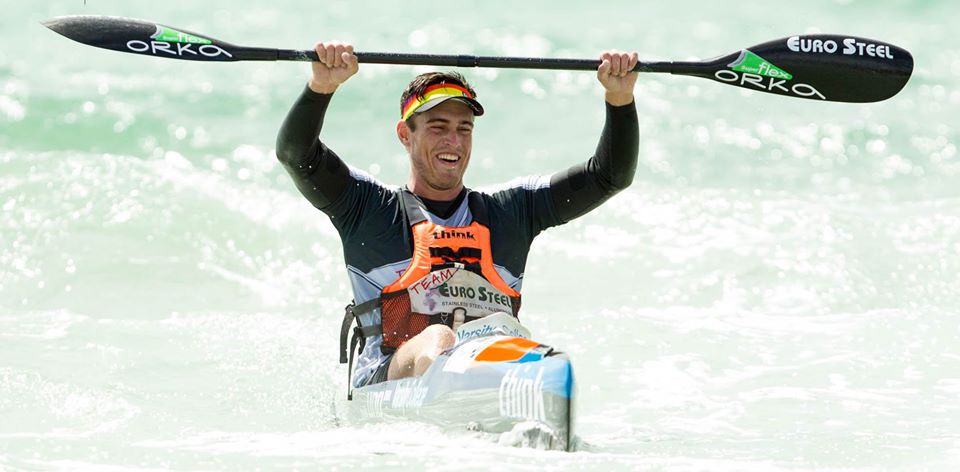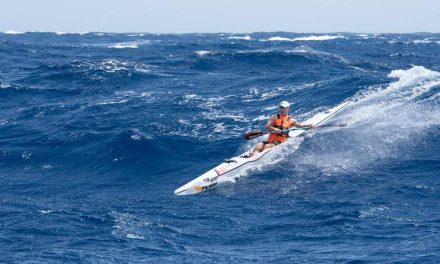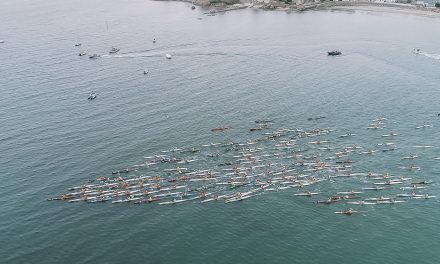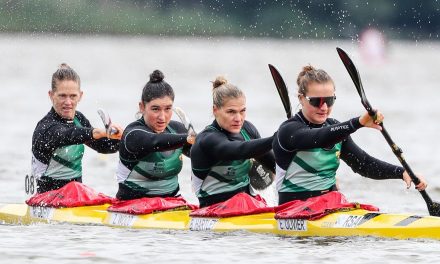SOUTH AFRICAN STRENGTH IN SURFSKI SHUTDOWN
Every morning Kenny Rice wakes up and looks out of his bedroom window at the downwind dream that is the famed Miller’s Run in Cape Town.
It’s a daily reminder of what he’s missing out on.
The constant stream of surfski photos and videos from his friends – and competitors – across the globe, living under more relaxed restrictions, doesn’t exactly help either.
But Rice, who finished second at last year’s ICF World Championships and second in the World Surfski League, doesn’t have to look much further than his own backyard to realise just how lucky he is.
“Kilometres away from my house there are people queuing in their thousands for food sources, while I’m sitting here looking at the ocean,” he says.
“It is more of a realisation that there is a much bigger power playing its part right now.
“Not being able to paddle isn’t the biggest stress.”
It’s a refreshing outlook, but one that he admits did take some time to reach.
The 24 year-old was hard at work preparing for another year spent largely on the road, racing all over the world, when the coronavirus pandemic took hold.
One by one, races were cancelled.
“It was a little bit of a loss, you know?” Rice says.
“You don’t know what to think because now this 12-week goal is gone and that’s normally what gets you through the year. You don’t know what to look forward to.
“The anxiety and uncertainty was incredible.”
But as more trips were abandoned, he actually began to feel more at ease.
“Once Canada was cancelled, I could actually accept that I wasn’t going and that was a lot of weight off my shoulders,” he says.
“It completely took it out of my hands. It was that realisation this isn’t in my control and I could just accept that.
“Once you can get your head around that and relax, it’s actually a nice feeling.”
South Africans have now been kept out of the water for more than six weeks and there is widespread belief that it may be another six weeks before they can get back in.
Like the paddlers from other countries under similar restrictions, there’s a lingering fear of the impact that the layoff will have on their future performance.
But according to one of the country’s surfski icons, there’s little reason for long-term concern.
“When you get an injury, you have to go and rest, it’s forced. Here, you have that same situation.” Oscar Chalupsky says.
“The biggest problem [for paddlers] is to keep their weight down and keep that exercise going, so that when they can come back, it doesn’t take long.
“This is actually an opportunity to test some of your diets and things like that. It’s like what happens when you get injured – you have to rest.”
“Now is a good time to rest.”
With borders closed for the foreseeable future, it’s currently unlikely that international racing will go ahead this year – but there is some potential in Australia.
The country has flattened the curve of new COVID-19 cases, with only a handful now recorded each day. In November it will host the second Shaw and Partners WA Race Week – the richest racing event in the world – and organisers haven’t given up hope that all of the sport’s leading athletes can attend.
It’s in that short-term timeframe where Chalupsky believes South Africans would be playing catch up.
“Yes of course, Australians would have to have a big advantage, a huge advantage,” he says. “It’s going to take two or three months for South Africans to catch up.
“But some guys adapt quickly. It could take three or four weeks and they’re back up to speed, others will take up to four months.
“That’s going to be interesting to see how people adapt.
“The people with really good techniques will come back quickly, while the guys that rely more on power will take much longer. I can tell you that for nothing.”
It’s a thought that has crossed Rice’s mind too. But rather than dwell on it, he’s choosing to focus on the positives.
He’s been running, doing home gym work and spending time on his Ergo, but his diet has also benefitted too. There’s no more restaurant meals with mates, and perhaps most beneficially, he’s unable to buy beer under the lockdown laws.
“I’m actually worried for everyone else because I’m going to be shredded coming out of this,” he laughs.
“If you compare it to your other breaks where you spend a large portion of time at the pub drinking and eating with friends.
“I don’t think I’m going to feel any different. Maybe a little less cardiovascular fit, but I’ll definitely come out of this physically and also mentally stronger.
“And maybe even with a six pack!”
And if Rice can’t compete overseas, there’s plenty to be excited about at home.
Given his hectic touring schedule, it’s been years since he’s focused his efforts on the domestic season, including the iconic Cape Point Challenge.
Rice and South Africa’s other big name stars now likely to do just that – and the next generation stands to benefit.
“That’s quite an exciting prospect actually,” he says.
“That’s something to look forward to, to pass some knowledge on. I wouldn’t consider myself to be very experienced, but maybe I can help someone in some way.
“I’ve never seen so much froth on Facebook for paddling before and I think that’s going to do tons for the sport.
“I’m just really excited to get back in the boat.”





